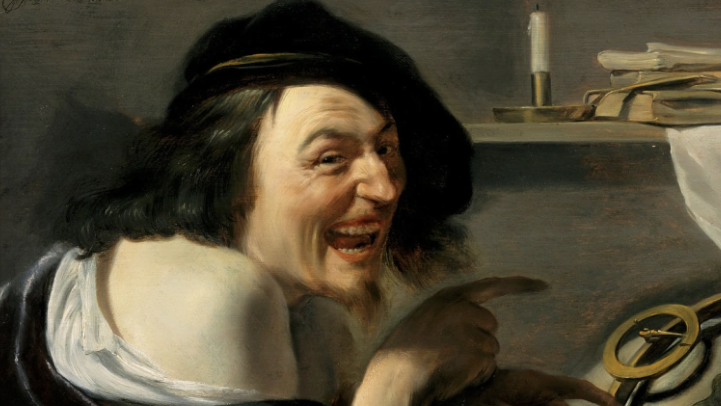5 philosophy jokes that will actually teach you something

- Philosophy can be difficult to understand, but humor can be a great way to approach it.
- Each of these jokes includes an explanation, so you can learn what they mean if you aren’t familiar with the underlying philosophy.
- Side effects of these jokes may include a sense of humor so dry it disproves Thales.
We’re here to help. Today, we have five philosophy jokes that will require some explanation. By the time you’ve read all of them, you’ll have had both a few laughs and a better understanding of philosophy and why it’s important.
What is reality made of?
Thales walks into a coffee shop and orders a cup. He takes a sip and immediately spits it out in disgust, he looks up at the barista and shouts, “What is this, water?”
Thales is commonly referred to as “The First Philosopher” because he is the earliest philosopher whose name we know. He was much more than a philosopher though; he also dabbled in business, engineering, astronomy, meteorology, and public policy.
His best-known idea is his metaphysics; he argued that water was the basis of all other substances. No matter how unaquatic something might seem to be (think of dry dust or fire) Thales argued that as it comes from water, and it remains water at the most fundamental level despite its changing traits.
Aristotle tells us this marked the first time any thinker tried to explain the world and how it worked in terms of natural laws. To this day, all science and philosophy that seeks to discover what reality is at its most fundamental level carrying on Thales’ work, though they have long since rejected his proposal.
How can I know anything?
Descartes takes his date, Jeanne, to a restaurant for her birthday. The sommelier hands them the wine list, and Jeanne asks to order the most expensive Burgundy on the list. “I think not!” exclaims an indignant Descartes, and he disappears.
Descartes was a French philosopher who tried to find the basis to his knowledge, solve the mind-body problem, and invented modern philosophy along the way. He also created that coordinate system you used so much in high school geometry.
His most famous quote, “I think; therefore, I am,” is from his book Meditations on First Philosophy. In this book, he tries to systemically doubt everything he thinks he knows until he finds the one thing he cannot doubt. As it turns out, that one thing is his own existence. Even if he doubts the accuracy of everything he sees, thinks, and believes in, he still has to exist to doubt it. He then used pretty weak arguments to get back to being able to believe in everything again, but that’s another story.
Descartes was carrying on a long line of philosophy that asked not only what exists but also how we could know. While he settled on the idea that we can trust our senses, others argue that we can’t or that there isn’t a real world for our senses to even detect.
What is the right thing to do?
Jeremy Bentham goes up to the counter at a coffee house, holding a $50 bill. “What’s the cheapest drink you have?” he asks. “That would be our decaf roast, for only $1.99,” says the barista. “Good,” says Bentham and hands her the $50. “I’ll buy those for the next twenty-five people who show up.”
Jeremy Bentham was the founder of utilitarianism, a philosophy and ethical theory that argues that the one good is happiness and the right thing to do is to maximize it. He was also quite the eccentric, a social reformer, and the mentor of a few brilliant English thinkers.
Utilitarianism treats everybody’s happiness as equal. Therefore, the in-joke Bentham knows he can create more happiness by buying coffee for everybody that comes in after him rather than spending the money on himself. The idea that we should be charitable is still a big part of utilitarianism and a core part of philosopher Peter Singer’s career.
Other important ethical theories of Bentham’s include deontology, which is based on following universal laws, and virtue ethics, which argues for building a strong character. While all three of these systems agree on a lot of things, their minor differences can lead to some pretty big disagreements.
What is the right way to organize society?
Pierre Proudhon goes up to the counter and orders a Tazo Green Tea with toffee nut syrup, two espresso shots, and pumpkin spice mixed in. The barista warns him that this will taste terrible. “Pah!” scoffs Proudhon. “Proper tea is theft!”
Pierre Proudhon was a French anarchist philosopher and the first to use the term “anarchist.” His political philosophy is the basis for modern anarchist thought and has influenced many other thinkers. In a rare turn for a political philosopher and more so for an anarchist, he once served as a legislator in the French government.
One of his more famous quotes is “Property is theft.” By “property,” he doesn’t mean your shirt or your toothbrush, but rather things like land or factories. To own, but not to personally use, such things typically means you’re hiring out other people to work for you and keeping part of their work for your profit. Proudhon saw this as unjust. His ideal society would feature cooperatives, communes, and mutual aid societies which would allow workers to keep the fruits of their labor for themselves.
Other thinkers have argued for very different ways of organizing society. Robert Nozick argued that private ownership was fine and taxation was tyranny. John Rawls argued that social democracy was the pinnacle of justice. Hegel thought constitutional monarchy was the last good idea in political philosophy anybody would have.
Even if they can’t agree, these philosophers ask essential questions about how the world works and how we might make it better.
Why these problems are important
Morty comes home to see his wife and his best friend, Lou, naked together in bed. Just as Morty is about to open his mouth, Lou jumps out of bed and says, “Before you say anything, old pal, what are you going to believe, me or your eyes?”
This joke is lovingly borrowed from Plato and a Platypus Walk into a Bar… .: Understanding Philosophy Through Jokes, a book by Thomas Cathcart and Daniel Klein that helps explain the history of philosophy through jokes.
As we saw with Descartes, the problem of what information we should believe and how we know it to be true is an important one. While sensory information may be acceptable in this case, Morty will now have to move on to thinkers like Aristotle, Bentham, and Kant to decide what to do next.
This article was originally published in July 2019. It was updated in June 2022.




